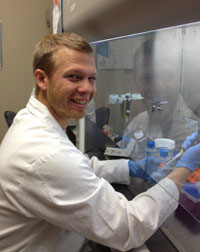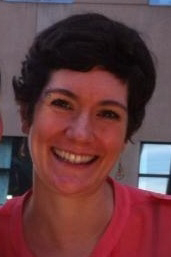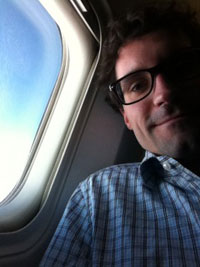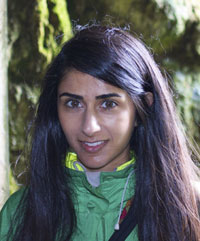Experimental Medicine is the study of the pathogenesis and treatment of disease. Modern experimental medicine represents a rapidly growing body of knowledge involving the determination of disease processes and the development of appropriate therapies.
Here at UBC, the Experimental Medicine program was first opened in 1987 and has since expanded to an incredible 137 PhD students, 70 MSc students, 1 MD/PhD student, and 207 supervisors, making it the largest program in the Faculty of Medicine. Members of the Department of Medicine direct research programs in a wide range of basic and clinically relevant areas. Specialties within this program are extremely broad, and include cardiology, endocrinology, gastroenterology, hematology, infectious disease, medical immunology, medical oncology, molecular biology, nephrology, neurology and respiratory medicine.
The broad range of disciplines represented in the program is highly apparent if you attend one of the biannual Experimental Medicine Student Research Days. These events provide students an opportunity to present their work in oral and poster presentations on topics including molecular mechanisms of disease, biomaterial engineering, epidemiology, and public policy analysis. The Student Research Days are also great networking events which bring together students and faculty that work at a variety of facilities throughout Vancouver. The June 2013 event included an engaging keynote address from the very distinguished Dr. Julio Montaner – Director of the BC Centre for Excellence in HIV/AIDS and former President of the International AIDS Society. His presentation not only outlined the current state of HIV/AIDS prevalence and treatment in BC and around the world, but also included candid stories of his personal career development and advice for students.
Generally, first year Experimental Medicine students will take part in both the MEDI501 (Molecular and Cellular Biology of Experimental Medicine) and MEDI502 (Experimental Medicine Methodology) courses. These courses include a broad overview of the cellular and molecular functions of normal tissues and specific disease processes, as well as a period of lab rotation and overview of grant and fellowship proposal writing.
The Experimental Medicine program also has an active Student Committee that organizes numerous social events each year. These include beach BBQs, Christmas parties, hiking trips, and a variety of other events.
Selected Recent Publications
The Role of FOXP3 in Regulating Immune Responses. Vent-Schmidt J, Han JM, Macdonald KG, Levings MK. Int Rev Immunol. 2013 Aug 15. [Epub ahead of print]
Transcription Factor p63 Regulates Key Genes and Wound Repair in Human Airway Epithelial Basal Cells. Warner SM, Hackett TL, Shaheen F, Hallstrand TS, Kicic A, Stick SM, Knight DA. Am J Respir Cell Mol Biol. 2013 Jul 9. [Epub ahead of print]
A novel hydrogel-collagen composite improves functionality of an injectable extracellular matrix. Hartwell R, Leung V, Chavez-Munoz C, Nabai L, Yang H, Ko F, and Ghahary A. Acta Biomaterialia (2011) Vol 7 (8) 3060-3069.
The Citrobacter rodentium Mouse Model: Studying Pathogen and Host Contributions to Infectious Colitis. Bhinder G., Sham H.P., Chan J., Morampudi V., Jacobson K., and Vallance B.A. J. Vis. Exp. (2013) Vol 72, e50222, doi:10.3791/50222.
Student Profiles
Jens Vent-Schmidt is a 2nd year PhD student in Dr. Megan Levings’ lab at the Child & Family Research Institute. He joined this lab after obtaining a Masters level degree in Molecular Medicine from the University of Freiburg in Germany. Research in Dr. Levings’ lab is focused on regulatory T cells (Treg), a subset of T cells which control immune homeostasis. Tregs prevent inappropriate immune responses by suppressing inflammatory cells by multiple mechanisms. Jens’ goal is to use Chimeric Antigen Receptors to refine a Treg-based therapy that can reverse intestinal inflammation without the harmful side effects of immunosuppressive drugs. Outside the lab, Jens is an active science communicator and public outreach volunteer with Let’s Talk Science and StemCellTalks and he serves on several committees, such as the Experimental Medicine Student Committee. In 2013, he was nominated for the Let’s Talk Science National Volunteer of the Year Award and he received the UBC Your Year Doctoral Fellowship. In his leisure-time, Jens is an avid mountaineer and outdoor enthusiast and he is engaged in the UBC Varsity Outdoor Club.

Jens Vent-Schmidt
Stephanie Warner is a PhD candidate at the Centre for Heart Lung Innovation at St. Paul’s Hospital, working under the supervision of Dr. Tillie-Louise Hackett of the Department of Anaesthesiology, Pharmacology and Therapeutics. The Hackett lab studies the role of airway structural cells, such as epithelial cells and fibroblasts, in chronic respiratory diseases such as asthma and COPD. Stephanie’s project focuses on understanding how the cells lining the airways – the epithelium – are altered in asthma. She uses a laboratory cell culture technique that allows cells from human airways to grow and develop in such a way that they develop cilia and make mucus, similar to what would be found in the intact airway. Using this model, she is helping to understand the differences at the cellular level between healthy patients and those with asthma. In particular, how these cells differ between asthmatic patients with exercise-induced bronchoconstriction and those without. The lab hopes to identify potential therapeutic targets that could protect the epithelium from excessive damage, and which would ideally reduce or even halt the progression of asthma. In her spare time, Stephanie is also involved with UBC Let’s Talk Science and Genome BC, providing science outreach to underserved communities in rural British Columbia.

Stephanie Warner
Ryan Hartwell is a PhD. Candidate in Experimental Medicine at the University of British Columbia. His primary research focus in Tissue Engineering consists of developing innovative solutions for Wound Healing and Transplantation. As a Graduate Student Ryan is a member of the BC Professional Fire Fighters Burn and Wound Healing Lab under the supervision of Dr. Aziz Ghahary. His core research employs a multidisciplinary approach developing in situ forming extracellular matrices, collagen-synthetic polymer bio-hybrids, for cell transplantation. The goal of this research is to create a non-rejectable patient-ready skin substitute system to treat burns and chronic wounds (diabetic ulcers, pressure ulcers, etc.). Outside of science, Ryan has extensive experience with industry co-founding a small biomedical start-up and patenting 2 wound products during his undergraduate years of study. In his 4 years as a PhD student Ryan has published 14 peer-reviewed articles and has given numerous workshop presentations on wound healing, tissue engineering and entrepreneurship. Ryan held the CIHR Skin Research Training Scholarship for three consecutive years and CIHR Training in Transplantation award. He was a founding board member for the UBC Chapter of the Canadian Biomaterials Society and is currently a reviewer for the Journal of Tissue Engineering. Ryan’s interest in wound care stem from his past experiences in teaching Lifeguards and First Aid Training, aside from his overall passion to innovate.

Ryan Hartwell
Ganive Bhinder is a PhD Candidate entering her third year in Dr. Bruce Vallance’s lab at the Child & Family Research Institute. Her research is focused on understanding the mechanisms underlying the development of intestinal scar tissue/fibrosis as is often seen in patients suffering from Crohn’s Disease, the only treatment for which is invasive and traumatic surgical intervention. Using a novel model of intestinal fibrosis, she is examining the cell types that release the proteins making up the scar tissue/fibrosis, and exploring whether these cells migrate into the intestine from the blood stream, or whether they arise from the intestine itself. Further, she is examining the potential role of intestinal bacteria in driving this response. The goal of her studies is to help improve our understanding of the mechanisms involved in the generation of intestinal fibrosis, hopefully leading to the identification of novel targets for therapeutic intervention to treat or prevent intestinal fibrosis. Outside of the lab, Ganive is extensively involved with the Crohn’s & Colitis Foundation of Canada, chairing the committee that organizes their largest annual fundraiser “The Gutsy Walk” and hoping to help spread awareness about these diseases.

Ganive Bhinder